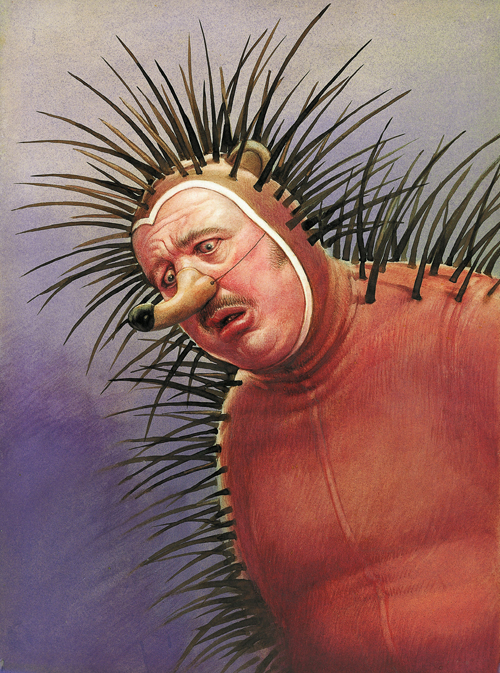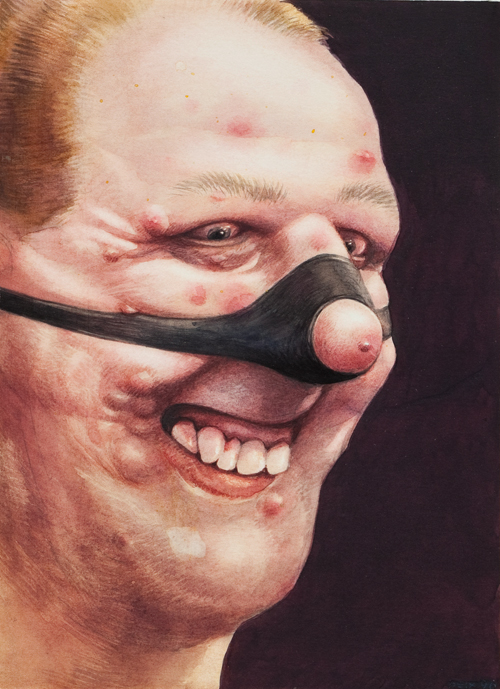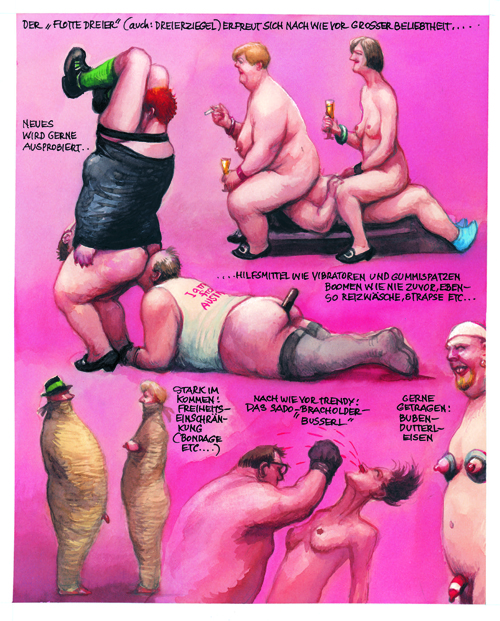Parental Guidance
Viennese author Stefanie Sargnagel talks about her idol, the caricaturist Manfred Deix
Viennese author Stefanie Sargnagel talks about her idol, the caricaturist Manfred Deix

Dominikus Müller In a recent Facebook post, you wrote: ‘As a child, my favourite books were always those by Manfred Deix.’ You posted this with a caricature showing various positions for threesomes – a typically obscene dra-wing by Deix. What were you like as a child?
Stefanie Sargnagel I was already very obscene, and I totally loved Deix caricatures – all the cocks, the hardcore paedophilia jokes. We had his books at home. Not suitable for children, of course, but I was already fascinated by anything offensive.

Landessammlungen Niederösterreich and Manfred Deix
DM What do you find funny about them?
SS It’s a very harsh humour, about as harsh as it comes; very anarchic and not at all politically correct. Drawings of babies being sat on huge dildoes while someone else films – it doesn’t get more disturbing than that. Paedophilia is the last taboo that people observe even in the realm of humour.
DM But not Deix.
SS Exactly. His drawings used to cause a scandal, but now he doesn’t draw much criticism. Compare that in Germany, where the satirical magazine Titanic was served a restraining order by the Vatican because of a cover featuring the Pope with a urine stain on his cassock – please! Deix is always drawing priests fucking each other and no one cares. In Austria, that kind of thing is mainstream humour.

DM Deix’s humour plays on taboos – yet is very popular. Isn’t that a contradiction?
SS It’s hard to talk about an ‘Austrian mentality’ but there are certain patterns nonetheless. Austrians have a tendency to identify with their own secretions. Even great writers and humourists – people like Elfriede Jelinek, Ulrich Seidl, or Gelitin. Everything here is scatological. It’s always about shit and scabs and snot. That’s just what people like.
DM How is Austrian humour different from German humour?
SS People always say that Germans and Austrians have incompatible senses of humour. And I wonder whether my books work in Germany at all. In Austria, people are rather disparaging about German humour. I deeply despise comics like Bully Herbig. And with the better kinds of German humour, like Loriot, I have the feeling that it’s more middle class. In Austria it comes if not from an underclass then certainly from a working-class mentality. Most blue-collar workers have a Deix book at home. That’s quite normal. Although Deix is also very popular among the educated middle class too, I like the fact that he’s not an intellectual. There’s a documentary that I also recently posted on Facebook where that becomes very clear. Deix is someone who drinks too much and so on.

DM Alcohol also plays a major role in your writing …
SS Yes, and chain smoking. In the documentary, Deix claims he smokes six packs a day. He also lives with 80 cats. He keeps saying he loves cats, drawing and his wife. Those are his key coordinates. Somewhere else in the film he talks about when he was a kid, playing model railways with the other children: sitting around with these rosy-cheeked losers watching trains going round and round. And he thought to himself: ‘Is this all life has to offer?’ I can totally relate to that! My relationship to Deix is extreme. He’s almost my only idol. At least the only one who has remained constant.
DM Where do you think the points of overlap lie with Deix’s caricatures and your texts?
SS I love his severe humour, its grotesque, super-sexual quality. In my texts there’s also plenty of fucking, shitting and cocks. I started telling dirty jokes at a very young age. At children’s birthday parties the parents would say: ‘Steffi, what’s that you’re saying?!’ My first drawings were also pretty obscene. Vulgar, nasty things. But it suited me. As a child Deix already loved drawing naked people too. And he was the star because he sold these pictures to his classmates. I’m not so great at drawing, so I didn’t go that far. Deix went to ‘die Graphische’, Vienna’s graphic arts college. I applied there but didn’t get in because I didn’t prepare properly. Even then, I wasn’t very ambitious.
DM Now you’re studying painting with Daniel Richter at Vienna’s Academy of Fine Arts, where Deix also went after he was kicked out of die Graphische.
SS Yes. I’ve been studying for eight years, but I haven’t done much. It was cool to be able to say I was a student. Now I’m realizing that I got something out of it nonetheless, especially all the partying.

DM In your e-book In der Zukunft sind wir alle tot, a collection of Facebook posts, you write: ‘My years of going out drinking and doing nothing turn out to have been networking after all.’
SS I always thought we were all tramps, alcoholics and junkies. Now I realize that many of these people have become artists, curators and journalists. I was really surprised.
DM Do you think there’s an affinity between caricature and Facebook posts, a certain notion of condensation, a principle of brevity?
SS That applies to humour in general, I’d say – you have to get it just right, you have to exaggerate the right things. Everything has to be very precise. My posts are written spontaneously; I like to tell jokes. Anything else is boring and hard work. I’m a lazy person.

DM Deix once said people are getting more and more beautiful. But beautiful people are a problem, because they lack depth. And he needs depth for his caricatures.
SS That’s logical. Hidden depths are far more interesting. Beautiful people are really easy to draw. A nice symmetrical nose is easy to trace. But capturing a very distinctive, peculiarly shaped nose is difficult. I think Deix’s drawing style is magnificent. Everything looks so dirty, so terrible. His pictures remind me of Vienna and the Viennese pubs of my childhood – a world that no longer exists. The pictures look like the walls of a bar that have turned yellow from all the smoke. I prefer old things anyway, from the ’80s and ’90s.
DM The Deix world really is a very smutty, old man’s world, don’t you think?
SS Sure, but in his case it somehow doesn’t bother me. Although it comes across as macho, in the end he makes fun of everyone. Everyone’s made to look bad, including Deix himself. There’s a healthy dose of self-loathing. Deix says he never goes swimming because he finds his body so ugly. Humour comes out of misery, as a response to bad situations, and breaking taboos is a form of relaxation. At least according to Wikipedia. Also, I believe the internet has changed women’s attitudes to humour. It used to be a male domain – hogging the limelight, wanting to get on stage and tell the most offensive jokes. People often say women aren’t funny – but suddenly lots of funny women are now appearing on Twitter and Facebook.
Translated by Nicholas Grindell
A permanent exhibition of Manfred Deix’s caricatures is on view at the Karikaturmuseum Krems. Deix’s latest book Neue Zeichnungen was recently published by Carl Ueberreuter Verlag, Vienna.
























